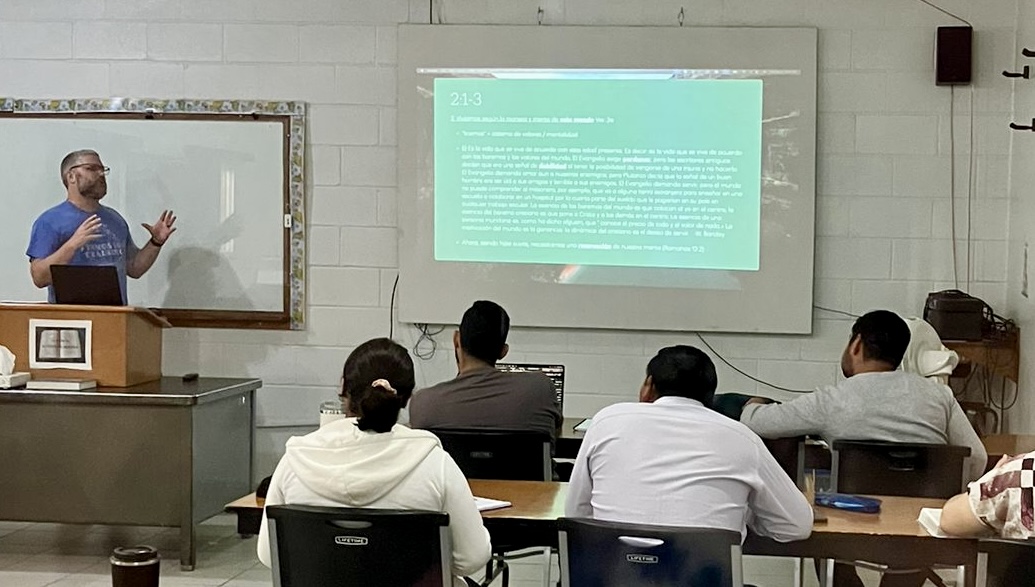In Mexico, we have two two-year Bible institutes and one two-year cross-cultural ministry training program dedicated to training believers from local Mexican churches in cross-cultural church planting ministry. This semester, I have had the privilege of teaching through the book of Ephesians at our Chihuahua Bible Institute.

Ephesians is the tenth book in the New Testament and is written by the Apostle Paul. It was a letter sent to Ephesian believers during his first Roman imprisonment. Under house arrest, Paul wrote letters to the Ephesians, Philippians, Colossians, and to Philemon. He had first visited Ephesus briefly on his second missionary journey, but then spent a substantial amount of time with them on his third. After a final visit with the Ephesian church elders at the end of his third missionary journey, he was incarcerated in Jerusalem, eventually leading to his Roman imprisonment.
In his letter to the Ephesians, Paul reveals God’s previously undisclosed plan of uniting both Jews and Gentiles into one body through Jesus Christ. (Eph 3:6) Before Christ, believers were dead in their sins, separated from God, and were His enemies. (Rom 5:10; 6:11-14; Eph 2:1-3; Col 1:21) They lived enslaved to the world, the flesh, and the devil. (Eph 2:1-3) In Christ, believers are united to one another, regardless of national identity. They have been saved by grace through faith, and are holy, blameless, adopted, forgiven, redeemed, and sealed by the Holy Spirit, all because of the work of Christ on the cross. (Eph 1:3-14; 2:8-9) They are no longer enslaved to the world, the flesh, and the devil, but are free to live by the Spirit in the good works that He planned for them before the foundation of the world. (Rom 6; Gal 5; Eph 2:10)
Most readers of Ephesians note that chapters 1-3 focus on the believer’s identity in Christ (who they are in Him) and then chapters 4-6 focus on the believer’s walk with Christ (how they live for Him). Paul begins his letter by explaining what is true about them in Christ, and then he challenges them to live according to the truth. In Ephesians in particular, he begins chapter 4 with a call to unity.
This leads to something I have been mulling over: we live out from who we are. Or to say it differently, our self-perception affects how we live. When we are unsure of God’s love, grace, acceptance, and forgiveness, we will live in a way that incessantly tries to earn them from Him or others. And what we find is that when we are performing well, we feel secure, and when we are not, we feel insecure. We either measure up or we fall short. We also find that it distorts our view of God and others. God is always disappointed in us, and other people are disappointing to us. They either measure up or fall short. It’s a game of weights and balances.
But if, by faith, we rest in what He says about us in Christ, we are free from all of that. Our acceptance and love are set and settled because of the perfect work of Jesus Christ. We do not have to earn or achieve what Christ has accomplished on our behalf. We are free to love and live for Him and others from a position of humble gratitude for all that we have received in Christ. We are free from the weights and balances. We are secure.

Now, will this security in Christ lead to a low view of sin? If so, that would be incongruent. For me, growing in understanding the depth of God’s love for me in Christ and all the blessings I have received from His hand has led to a more profound desire to love and please Him. Far from taking sin lightly, His love compels me to acknowledge and confess it as especially grievous in the light of His immeasurable goodness. Grace teaches us to deny ungodliness. (Titus 2:11-12)
So, what is the point of all of this? We need to deepen our understanding of the set and settled love of God that we have in Christ, in which we are completely accepted in Him, and we need to live out from that. This moves us towards Him and others. It liberates us to live for Him with gladness.
“And you have the power to understand, as all God’s people should, how wide, how long, how high, and how deep his love is. May you experience the love of Christ, though it is too great to understand fully.”
Ephesians 3:18–19a
Karri J Iverson says
I love this! This part is so true: Now, will this security in Christ lead to a low view of sin? If so, that would be incongruent. For me, growing in understanding the depth of God’s love for me in Christ and all the blessings I have received from His hand has led to a more profound desire to love and please Him.
Tom says
Thanks, Karri! Glad you found it edifying! Hope you guys are well!